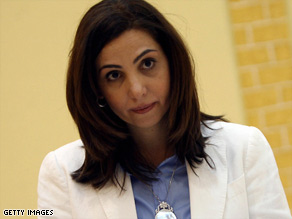Woman elected in Kuwait says gender in politics is 'history'
- Story Highlights
- NEW: Elected female lawmaker says election shows support for female politicians
- Women pick up four seats in parliament for first time ever in Kuwait
- Women were first granted right to vote, run for office in 2006
- 210 candidates ran for 50 seats in the general election; 16 were women
(CNN) -- As one of the first four female lawmakers ever elected to Kuwait's parliament, Aseel al-Awadhi knows she has a tough road ahead in the conservative Gulf state's male-dominated legislature.

Rola Dashti is one of four women who won parliamentary seats in the recent elections in Kuwait.
Still, victory is sweet.
"Even before the results, people were piling up to congratulate me either from my own district or from other districts," al-Awadhi, a university instructor, told CNN Sunday.
"I think that shows you the tremendous amount of support for women's role in politics," she said. "And I think today I can confidently say that [the] gender issue is history in Kuwait -- I mean, regarding women's role in politics."
Men have filled the seats of Kuwait's parliament for nearly five decades, and it was only four years ago that the country granted women the right to vote and run for office. ![]() Watch new lawmaker discuss historic win »
Watch new lawmaker discuss historic win »
But, despite failed attempts in the past two elections, four women -- al-Awadhi, Rola Dashti, Salwa al-Jassar and Masouma al-Mubarak -- won parliamentary seats in Saturday's general elections.
"The Kuwaiti women have been able to notch up this great victory at a crucial time and set a precedent in the history of Arabian Gulf parliaments," Mohammad Al-Feili, a constitutional law professor at Kuwait University, told the official Kuwait News Agency.
Two-hundred-and-ten candidates ran for 50 seats in the general election; 16 were women.
Al-Awadhi said the elections proved Kuwaitis want political change.
"Yes, they do, absolutely," she said. "Yes, I mean, this is my second time running for election. I ran last time ... and yes, people were talking about change. But this time, I realized that people are determined -- that they want to achieve change, they want to see change happen."
The elections were called after the emir, Sheikh Sabah al-Ahmad al-Sabah, dissolved parliament, which is made up mostly of opposition politicians. He said he was dissolving parliament to put an end to a crisis that had paralyzed decision-making.
The parliament had been locked in a feud with the government, which it accuses of corruption and abuse of power. It has been pressuring the government for the right to question ministers on deals.
"We don't mean changing the ruling system -- we mean change within the parliament," al-Awadhi told CNN. "Because the parliament has been dominated by certain political groups for years and years. ... Their representation is intense, and their agenda also has been dominating the parliament agenda.
"So I think, when people speak about change, they need change and shifting the attention towards people's needs and desires. And most of the parliament members during the last several years were not attending to people's needs and desires.

The parliament is made up of elected lawmakers, but ministers are appointed.
The al-Sabah family has run Kuwait since it came into existence more than two centuries ago.
All About Kuwait • Sabah al-Ahmad al-Sabah

 Sit tight, we're getting to the good stuff
Sit tight, we're getting to the good stuff
